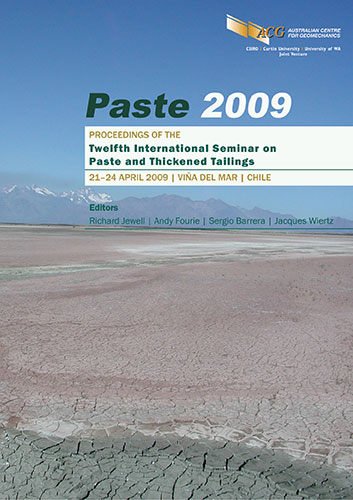High Density Thickened Tailings Transport by Gravity

|
Authors: Pornillos, EU; Loayza, CC; Cabrejos, JA |
DOI https://doi.org/10.36487/ACG_repo/963_27
Cite As:
Pornillos, EU, Loayza, CC & Cabrejos, JA 2009, 'High Density Thickened Tailings Transport by Gravity', in R Jewell, AB Fourie, S Barrera & J Wiertz (eds), Paste 2009: Proceedings of the Twelfth International Seminar on Paste and Thickened Tailings, Australian Centre for Geomechanics, Perth, pp. 233-242, https://doi.org/10.36487/ACG_repo/963_27
Abstract:
Golder has been developing a protocol for characterising the gravity flow of thickened tailings in open channels. The protocol employs a test apparatus consisting of a portable flume that allows field tests to be carried out at site. Key features include an adjustable slope setting and surface roughness. Equipped with a recirculation loop and a variable speed peristaltic pump, the gravity flow of thickened slurry can be characterised at various slopes, volumetric flow rate and the corresponding stream profile. Through the pump loop, rheological properties of the pulp is determined from samples taken off the line at any time using a Haake VT550 viscometer. Flow rates can be calibrated manually. The laboratory in Lima-Peru has two types of apparatuses, a 3 m long fixed width flume and a 5 m long steel flume with variable width. Surface roughness can be modified. The recirculation loop has a throughput up to 6m3/h. The slope is adjustable from 0% to over 5%. For the testwork, conventional tailings materials were sourced from various mines in Peru. The slurries were dewatered to a range of concentrations, from dilute to paste-like consistency. Using a rotational viscometer, the static yield stress of the actively flowing stream was determined immediately, thus the relationship between solids content and degree of shear-thinning through the recirculation can be established. Recently, the Golder’s protocol and flume apparatuses were employed at two mines in Peru in the simulation of flows in open channel. In this paper, the laboratory and field results are presented in graphical format. The major findings of the current work are: a) the effect of yield stress on slopes b) there is a critical value of yield stress at which gravity flow is stable c) flow rate and slope relationships appear to be mainly dependent on rheology d) the requirements of mass and energy balance is satisfied e) in high density flocculated and thickened tailings, the rheology changes rapidly with shear rate, hence the critical slope changes accordingly f) the pattern of the stream flow of high yield stress pulps are not fully explained by the classical hydraulic model c) the modelling can be extended to prediction of flow in natural gullies.
References:
Pirouz, B., Kavianpour, M.R. and Williams, P (2005) Thickened tailings beach deposition field observations and full-
scale flume testing, Proceedings of the Eighth International Seminar on Paste and Thickened Tailings,
A.B. Fourie and R.J. Jewell (eds), Australian Centre for Geomechanics, Perth, Australia, pp. 53–72.
Rayo Prieto, J. (1993) Transporte hidraulico de solidos a grandes distancias, SONAMI, Lima, Peru, April.
242 Paste 2009, Viña del Mar, Chile
© Copyright 2026, Australian Centre for Geomechanics (ACG), The University of Western Australia. All rights reserved.
View copyright/legal information
Please direct any queries or error reports to repository-acg@uwa.edu.au
View copyright/legal information
Please direct any queries or error reports to repository-acg@uwa.edu.au